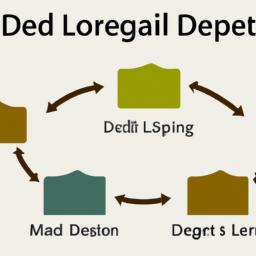What is the Best Debt Consolidation Loan: Simplifying Your Finances
Introduction

Are you drowning in a sea of multiple debts, struggling to keep your head above water? It’s time to take control of your financial situation and find a solution that can provide relief. Debt consolidation loans have emerged as a popular choice for individuals seeking a way to simplify their finances and reduce the burden of multiple debts. But what exactly is debt consolidation, and how can it benefit you?
What is Debt Consolidation?
Debt consolidation is a financial strategy that involves combining multiple debts into a single loan with a lower interest rate. Instead of juggling various monthly payments, you consolidate all your debts into one, making it easier to manage your finances. This approach not only simplifies your repayment process but can also potentially save you money in interest payments over time.
Benefits of Debt Consolidation Loans
Now that we understand the concept of debt consolidation, let’s explore the advantages it offers. Here are some key benefits of debt consolidation loans:
-
Streamlined Finances: By consolidating your debts into a single loan, you can say goodbye to the complex web of multiple due dates, interest rates, and minimum payment requirements. This simplification allows you to focus on a single monthly payment, making it easier to budget and manage your money effectively.
-
Lower Interest Rates: One of the primary reasons individuals opt for debt consolidation loans is to secure a lower interest rate. High-interest debts, such as credit card balances or payday loans, can be consolidated into a loan with a more favorable rate, potentially saving you a significant amount of money in the long run.
-
Reduced Monthly Payments: With a lower interest rate, your monthly payment amount can decrease, providing you with more breathing room in your budget. This reduction in monthly payments can relieve financial strain and help you regain control over your finances.
-
Improved Credit Score: Consistently making on-time payments towards your consolidated loan can positively impact your credit score over time. As you pay off your debts and demonstrate responsible financial behavior, your creditworthiness improves, opening doors to better loan offers and financial opportunities in the future.
Now that we have a solid understanding of what debt consolidation is and the benefits it offers, let’s delve deeper into the world of debt consolidation loans. In the next section, we will explore the different types of debt consolidation loans available and how they work. Stay tuned!
Understanding Debt Consolidation Loans

Debt consolidation loans are a powerful tool for individuals seeking to simplify their financial obligations and regain control over their money. In this section, we will delve into the intricacies of debt consolidation loans, exploring their definition, purpose, and various types available.
Definition and Purpose of Debt Consolidation Loans
A debt consolidation loan is a financial product that allows you to merge multiple debts into a single loan, typically with a lower interest rate. The primary purpose of a debt consolidation loan is to simplify your repayment process by consolidating all your debts into one manageable monthly payment. This approach eliminates the hassle of dealing with numerous creditors and due dates, bringing peace of mind and financial stability.
How Do Debt Consolidation Loans Work?
Debt consolidation loans work by providing you with a lump sum amount that covers the outstanding balances of your existing debts. You then use this loan to pay off your individual debts, leaving you with only one loan to repay. The interest rate on the consolidation loan is usually lower than the average interest rates of your previous debts, allowing you to save money on interest payments in the long run.
Different Types of Debt Consolidation Loans
When it comes to debt consolidation loans, there are several options to choose from. Here are the most common types:
1. Secured Debt Consolidation Loans
Secured debt consolidation loans require you to provide collateral, such as a home or a vehicle, to secure the loan. This collateral acts as a guarantee for the lender, reducing their risk and allowing them to offer lower interest rates. However, it’s essential to consider the potential risk of losing your collateral if you fail to repay the loan.
2. Unsecured Debt Consolidation Loans
Unsecured debt consolidation loans do not require collateral, making them a more accessible option for individuals who don’t own valuable assets. Since there is no collateral involved, unsecured loans typically have higher interest rates compared to secured loans. Lenders assess your creditworthiness and financial stability to determine your eligibility and interest rate for an unsecured loan.
3. Home Equity Loans
Home equity loans, also known as second mortgages, allow homeowners to borrow against the equity they have built in their homes. These loans can be used for debt consolidation purposes, leveraging the value of your property to secure a lower interest rate. However, it’s crucial to consider the potential risks and implications of using your home as collateral.
4. Personal Loans
Personal loans are another common option for debt consolidation. These loans are typically unsecured and based on your creditworthiness. Personal loans can provide flexibility in terms of loan amounts and repayment periods, allowing you to tailor the loan to your specific needs.
5. Balance Transfer Credit Cards
Balance transfer credit cards enable you to transfer your high-interest credit card balances onto a single card with a low or zero introductory interest rate. This option can be an effective way to consolidate credit card debt, but it’s important to carefully consider the terms and fees associated with the balance transfer.
Now that we have explored the different types of debt consolidation loans, we can move on to the next section, where we will discuss the essential factors to consider when choosing the best debt consolidation loan for your needs. Stay tuned for valuable insights!
Factors to Consider When Choosing a Debt Consolidation Loan

When it comes to selecting the best debt consolidation loan for your needs, there are several crucial factors that you should carefully evaluate. Taking the time to consider these aspects will help ensure that you make an informed decision and choose a loan that aligns with your financial goals. Let’s explore the key factors to consider:
Interest Rates and APRs
One of the most critical factors to examine when comparing debt consolidation loans is the interest rate and the Annual Percentage Rate (APR). The interest rate determines the cost of borrowing, while the APR provides a comprehensive picture by including additional fees and charges. Aim for a loan with a lower interest rate and APR to save money in the long run.
Loan Terms and Repayment Period
Consider the length of the loan term and the repayment period when evaluating debt consolidation options. A longer repayment period may result in lower monthly payments, but it could also mean paying more in interest over time. Assess your financial situation and determine the ideal balance between manageable monthly payments and minimizing interest costs.
Fees and Charges
Be aware of any additional fees and charges associated with the debt consolidation loan. These may include origination fees, prepayment penalties, or late payment fees. Carefully review the loan terms and conditions to understand the full extent of potential fees and factor them into your decision-making process.
Eligibility Requirements
Each lender has specific eligibility requirements that borrowers must meet to qualify for a debt consolidation loan. These criteria may include a minimum credit score, a certain level of income, or a specific debt-to-income ratio. Ensure that you meet the lender’s requirements before applying to save time and increase your chances of approval.
Lender’s Reputation and Customer Reviews
Research the reputation and track record of the lenders you are considering. Look for reviews and feedback from other borrowers to gauge their experience and satisfaction. A reputable lender with positive customer reviews is more likely to provide reliable service and support throughout the loan process.
By carefully evaluating these factors, you can make an informed decision and select the best debt consolidation loan that suits your needs. In the next section, we will explore the steps you can take to find the ideal loan for your financial situation. Let’s dive in!
Tips for Getting Approved for a Debt Consolidation Loan
When seeking a debt consolidation loan, it’s essential to position yourself as a strong and reliable borrower. Lenders will evaluate various factors before approving your loan application. To enhance your chances of approval and secure favorable terms, consider the following tips:
A. Improve your credit score
Your credit score plays a crucial role in determining your eligibility for a debt consolidation loan and the interest rate you will receive. Take proactive steps to improve your credit score by paying bills on time, reducing credit card balances, and avoiding new credit applications. Regularly monitoring your credit report allows you to identify and rectify any errors or discrepancies that may be negatively impacting your score.
B. Reduce your debt-to-income ratio
Lenders assess your debt-to-income (DTI) ratio to evaluate your ability to manage additional debt. Aim to reduce your DTI ratio by paying down existing debts and increasing your income. This not only improves your chances of loan approval but also demonstrates your commitment to responsible financial management.
C. Provide accurate and complete documentation
To streamline the loan application process, ensure you provide accurate and thorough documentation. This includes proof of income, bank statements, and any other requested financial information. By providing complete and organized documentation, you present yourself as a reliable borrower, enhancing your credibility in the eyes of lenders.
D. Consider a cosigner if necessary
If your credit score or income does not meet the lender’s requirements, consider enlisting a cosigner with a stronger financial profile. A cosigner acts as a guarantor for the loan, sharing the responsibility of repayment. This can increase your chances of loan approval and potentially secure more favorable terms.
By following these tips, you can position yourself as a creditworthy applicant, increasing your likelihood of getting approved for a debt consolidation loan. Remember, each lender may have specific requirements, so it’s essential to research and understand their criteria before applying. In the next section, we will conclude our guide by summarizing the benefits of debt consolidation loans and providing final thoughts.
Conclusion
In conclusion, finding the best debt consolidation loan can be a game-changer for your financial well-being. By consolidating your debts into a single loan, you can simplify your finances, reduce interest rates, and lower your monthly payments. To recap the key points we’ve discussed:
Debt consolidation offers a solution to manage multiple debts, bringing them together under one umbrella. This approach streamlines your finances and makes it easier to keep track of your payments. Additionally, debt consolidation loans often come with lower interest rates, allowing you to save money in the long run.
To find the best debt consolidation loan for your needs, it’s important to follow a few crucial steps. First, assess your financial situation and determine the total amount of debt you need to consolidate. Next, research and compare different lenders, considering factors such as interest rates, loan terms, and fees.
Don’t forget to check your credit score and history before applying for a loan. A good credit score can increase your chances of securing a favorable loan offer. Once you have an understanding of your creditworthiness, request personalized quotes and offers from various lenders. This will help you compare and choose the best option tailored to your unique situation.
Lastly, before finalizing any loan agreement, carefully read and understand the terms and conditions. Pay attention to the repayment period, interest rates, fees, and any potential penalties. Being aware of these details ensures that you make an informed decision and avoid any surprises down the road.
Remember, finding the best debt consolidation loan is a significant step towards financial freedom. By taking control of your debts and simplifying your finances, you can pave the way for a brighter financial future. So don’t wait any longer, start exploring your options and take the first step towards achieving your financial goals!
This article was proudly brought to you by kizi5.top, your trusted source for valuable financial insights.
Conclusion: So above is the What is the Best Debt Consolidation Loan: Simplifying Your Finances article. Hopefully with this article you can help you in life, always follow and read our good articles on the website: kizi5.top


